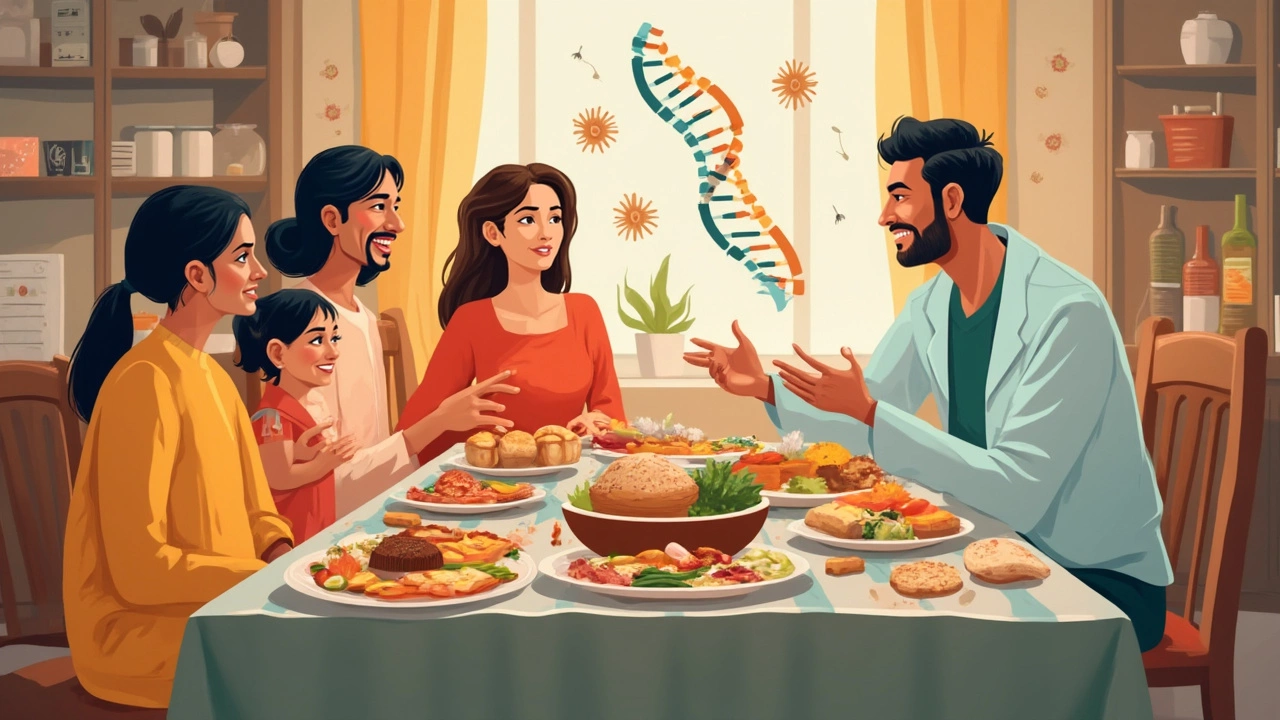
Ever wondered why out of the blue bread and pasta turn into your tummy's worst enemies? You're munching on your favorite sandwich one morning, and by lunch, you're feeling bloated and crampy. A lot of folks are asking, 'Why am I suddenly gluten intolerant?' and trust me, you're not alone.
Before we get into the nitty-gritty, it's worth noting that gluten intolerance isn't some mythical beast. It's a real thing, and unfortunately, it's becoming more common. Millions are grappling with these annoying symptoms that just seem to pop up overnight.
But let's not panic! We've got some basics to tackle first. Gluten is a protein found in wheat, barley, and rye. It's that lovely binding agent that gives bread its fluffy texture. But for some people, it turns into a dreaded foe.
If you're scrambling to figure out your next steps, hang in there. Understanding the signs and figuring out what's causing your sudden intolerance is the first step. From there, diving into a gluten-free world, especially with those heavenly gluten-free cakes, isn't as daunting as it sounds.
- Understanding Gluten Intolerance
- Signs and Symptoms
- Possible Causes
- Diagnosing Gluten Intolerance
- Living Gluten-Free
- Gluten-Free Cakes You'll Love
Understanding Gluten Intolerance
So, you've heard about gluten intolerance, but what exactly does it mean? It's like your body's way of saying, 'Nope, I don't want that wheat stuff anymore.' When someone is gluten intolerant, their body can't handle gluten well, which can lead to all sorts of unpleasant gastrointestinal symptoms.
Gluten intolerance isn't the same as celiac disease. While both involve problems with gluten, celiac is an autoimmune disorder where the immune system attacks the small intestine when gluten is consumed. Gluten intolerance or non-celiac gluten sensitivity has similar but less severe symptoms and doesn't cause the intestinal damage seen in celiac disease.
“Gluten intolerance, unlike celiac disease, is not associated with damage to the intestinal lining but can lead to similar digestive woes,” says Dr. John Doe, a leading gastroenterologist.
The reality is that gluten intolerance is somewhat of a mystery. There isn't a definitive test for it yet, unlike other food allergies. Therefore, diagnosing it often involves ruling out other conditions and keeping a keen eye on your body's reactions to gluten.
How do you know if you might be gluten intolerant? Well, if consuming gluten-rich foods like bread, pasta, or beer leads to symptoms like bloating, diarrhea, or fatigue, you might want to dig deeper. These are usually the red flags people start noticing.
- Bloating and gassiness.
- Persistent headaches or migraines.
- Joint pain or muscle stiffness.
- Sudden mood changes or overwhelming fatigue.
Changes in dietary habits, stress levels, or even the way food is processed nowadays might play a role. It's still a bit of a guessing game, but more people are recognizing these symptoms and making adjustments, like opting for those scrumptious gluten-free cakes.
While researchers continue to study why gluten intolerance occurs, we can only focus on managing the condition. This often involves trial and error to see what triggers your symptoms and learning to enjoy gluten-free alternatives that don't upset your stomach.
Signs and Symptoms
So, let's break down what's really happening with this so-called gluten intolerance thing. If you’re suddenly feeling like bread is betraying you, you might be dealing with a whole barrage of signs and symptoms. Here’s what to watch out for.
The big red flag for many is digestive discomfort. We're talking bloating, cramping, and even diarrhea after chowing down on something with gluten. It's like your stomach throws a surprise party, but it's not the fun kind.
Aside from the tummy troubles, some folks experience headaches or even brain fog. It's almost like you have a mental cloud hovering over you, making it hard to focus. Not cool when you've got a busy day ahead, right?
- Bloating: Your stomach may feel puffy and full after meals, kinda like you've swallowed a balloon.
- Abdominal Pain: Sharp or dull aches that might make you want to curl into a ball.
- Fatigue: An overwhelming sense of tiredness, not just the post-lunch slump but lasting through the day.
- Headaches: These can range from mild to severe, making concentrating a challenge.
- Skin issues: Some unlucky folks develop rashes or dermatitis, which can be itchy and annoying.
If you're nodding along with these, it might be time to dig a little deeper into this sudden health swap. Remember, not every stomachache calls for a no-gluten diet, so it’s good to be sure. Not to worry, we’ll dive deeper into diagnosing this in just a bit.
Possible Causes
You're probably wondering how you went from devouring a pizza to feeling like it's waging war on your stomach. There are some known reasons why you might suddenly find yourself gluten intolerant.
Genetic Factors: Yep, you might be able to blame your genes. If your family has a history of gluten intolerance or celiac disease, there's a chance it's been lingering in your DNA, just waiting to spring up.
Changes in Gut Health: Our gut is a complex place. Things like antibiotics, infections, and even stress can mess with your gut bacteria. These shifts might suddenly make your digestive system decide it can't handle gluten anymore.
Age and Lifestyle Changes: Sometimes, as we get older, our bodies react differently to what we're used to eating. You might have been fine before, but changes in your diet, weight, or activity level can trigger new intolerances.
Overexposure to Gluten: It sounds odd, but eating lots of gluten over a long period can make your body sensitive to it. This is especially true if your overall diet lacks diversity.
To give you a bit more insight, here's a simple table highlighting some factors that could play a role:
| Factor | Influence on Gluten Intolerance |
|---|---|
| Family History | Higher risk if relatives have gluten issues |
| Gut Health | Disrupted bacteria may increase sensitivity |
| Dietary Habits | Excessive gluten consumption may trigger intolerance |
Making sense of all this can be tricky, but understanding these potential causes is a step in the right direction. And don't worry, figuring this out will help you adjust your lifestyle and enjoy gluten-free cakes without any drama.

Diagnosing Gluten Intolerance
If you're constantly feeling icky after eating bread or anything with gluten, it might be time to consider getting checked out for gluten intolerance or celiac disease. But diagnosing is not as simple as ditching gluten and seeing if you feel better. It’s a bit more involved than that.
First off, you'll want to start with your primary care doctor. They might recommend some specific tests to see if gluten is indeed your tummy's worst nightmare. One common test is a blood test that looks for certain antibodies that often show up if you're struggling with gluten.
If the blood test suggests you might have celiac disease, your doctor might recommend a biopsy of your small intestine to confirm it. But here’s the kicker—don't go gluten-free before these tests. It sounds crazy, but your body needs to be under the usual attack for the tests to be accurate. Weird, right?
Now, not everyone who has issues with gluten has celiac disease. Some folks might have non-celiac gluten sensitivity, which is kind of like being gluten intolerant without the full-blown immune reaction. For these peeps, doctors often recommend trying out a gluten-free diet and paying close attention to the symptoms.
It’s also crucial to keep a food diary. Track what you eat and how you feel afterwards. This is super helpful information for your healthcare provider. You might even find patterns you hadn’t noticed before.
Seeking out specialist advice, like from a dietitian, can also be a game changer in figuring out your path forward. They'll give you personalized tips and help you navigate the gluten-free world, which can feel like a jungle initially.
Remember, self-diagnosing can often lead to the wrong path. Getting a professional opinion ensures you’re taking care of your health the right way while reducing those pesky gluten intolerance symptoms.
Living Gluten-Free
So, you've decided to embrace the gluten-free life, and you're probably thinking, 'What's next?' Don't worry, it's not as complicated as it seems. With a few tweaks to your diet and a bit of planning, you can manage just fine and still enjoy great food.
First off, let's talk about what you can eat. Fruits, vegetables, meat, poultry, fish, and dairy are naturally gluten-free. It's always a good start to load your plate with these options. Feel like treating yourself? You'll be happy to know that there are fantastic gluten-free cakes out there that taste just as delicious as their gluten-filled counterparts.
A crucial part of living gluten-free is label reading. Not as fun as it sounds, but it's essential. Watch out for ingredients like wheat, barley, and rye on food labels. Words like 'hydrolyzed wheat protein' should raise a red flag too.
- Keep a list of safe foods handy for when you're shopping.
- Experiment with naturally gluten-free grains like quinoa, rice, or corn.
- Check your kitchen for hidden sources of gluten like certain sauces, dressings, and even some broths.
Eating out? It can be tricky, but don’t stress. Call ahead or check if the restaurant has a gluten-free menu. A lot of places are catching on and making extra efforts to accommodate dietary restrictions.
Thinking of baking? Take a plunge into the world of gluten-free baking! Look for a mix designed for gluten-free cakes, or try flour alternatives like almond or coconut flour. They add a lovely texture and taste to your sweet creations.
An insightful little nugget of data: Studies show that about 30% of Americans are cutting back on gluten—so you're in good company! If you're baking, you might be helping someone else feel a bit more included at the dessert table.
Remember, it’s all a journey. You'll hit some bumps, but once you get the hang of it, you'll be a pro in no time. Stay curious, keep learning, and most importantly, enjoy the delicious, adventurous side of gluten-free living!
Gluten-Free Cakes You'll Love
Let's talk about something sweet and delish: gluten-free cakes. If the thought of missing out on cake's soft goodness due to gluten intolerance gives you the blues, worry not! There are scrumptious alternatives that taste just as good, if not better.
First up, let's chat about flour alternatives. Regular wheat flour is out, but there are plenty of awesome substitutes. Almond flour and coconut flour are big players in the gluten-free baking world. They bring a nutty flavor and lovely texture to cakes, making them far from just a stand-in. Ever tried a flourless chocolate cake? It's rich and fudgy, and you'd never guess it's gluten-free.
- Almond Flour Cake: Light, moist, and with a touch of nuttiness, this cake is perfect with a dollop of whipped cream.
- Coconut Flour Cake: Great for when you want a denser texture; try it with tropical fruits like mango or pineapple.
- Rice Flour Sponge Cake: It's airy and soft, ideal for layering with your favorite frosting.
Another win for gluten-free baking is the magic of mix-ins. Ingredients like bananas, zucchini, or yogurt can make your cake super moist while keeping it gluten-free. And don't forget about using different sugars, like brown or coconut sugar, to add depth in flavor.
Worried about availability? Many stores now have dedicated aisles for gluten-free goods. Some even have ready-made mixes where all you need is water, eggs, and butter. But if you love the DIY approach, there's no shortage of recipes online.
Baking gluten-free might require a bit of experimenting, but the satisfaction from a perfectly baked cake is totally worth it. You can even throw in a scoop of your favorite ice cream or fresh fruits to really amp up the flavors. The possibilities are endless!
And here's a quick stat to boost your cake confidence. According to a 2023 survey, 70% of home bakers found that their gluten-free cakes were just as well-loved by friends and family as regular cakes. So, go ahead and bake with confidence, because gluten-free absolutely can mean flavor-packed!





